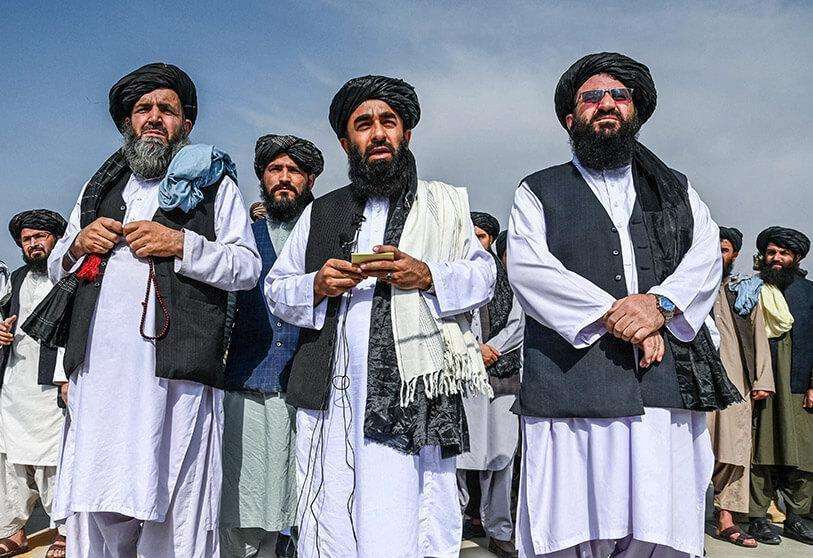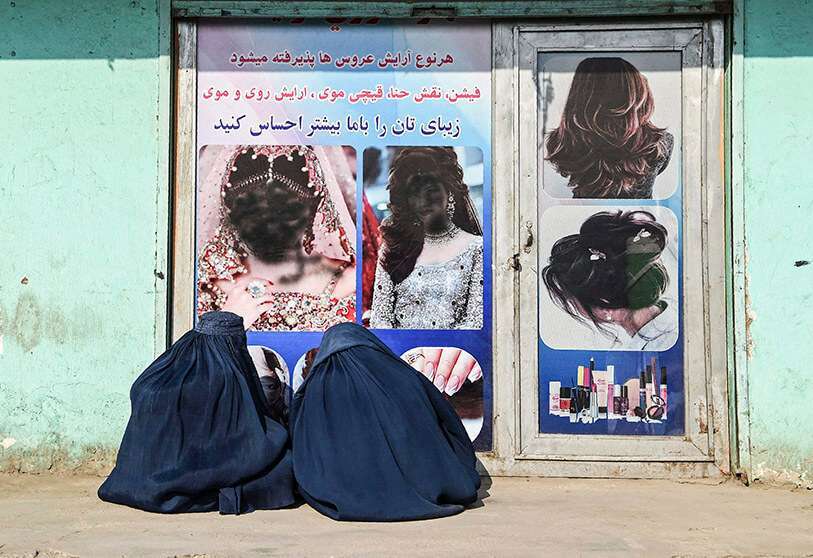One year on from the fall of Kabul: Taliban plunge Afghanistan into darkness

Ashraf Ghani did not even have time to put on his shoes. When Presidential Protection Service chief Qaher Kochai and National Security Adviser Hamdullah Mohib chartered a flight to Tajikistan and forced the then president out of Afghanistan, convinced that the Taliban would finish him off like they did Mohammad Najibullah, Ghani had no choice but to accept. Despite the accusations, he fled the country barefoot and without millions of dollars in his suitcase, according to a report by the US Inspector General for Afghanistan Reconstruction (SIGAR), which compiles dozens of testimonies from the hours before the fall of Kabul.
It is the first anniversary of the second fall of Afghanistan to fundamentalists. In August 2021, the Taliban stormed unopposed into the presidential palace in the heart of Kabul's Green Zone, where they roamed free for a few hours. They claimed victory. The country's main cities fell like dominoes, almost by inertia, in the face of the failure of the Afghan army and US troops to show up. 20 years is nothing. The lightning offensive that began in Kandahar subdued in just two weeks. The blows at Mazari Sharif and Jalalabad were definitive, but no one predicted the fall of Kabul.
Panic. Tens of thousands of people in various parts of the country rushed to flee. Having collaborated with the previous regime, professing another branch of the same faith or being suspected of either was an anticipated condemnation. Survival became the number one goal for half of the Afghans, the women. The capital's Hamid Karzai airport collapsed, there was no room for everyone and desperation pushed people to climb onto the wings of aircraft, it was better to try the impossible than to stay. With safe conduct and limited time, hysteria gripped everyone and everything. Afghanistan was plunged into darkness once again. The Taliban took control.

A year later, no state has officially recognised the Taliban regime, despite all the cajoling. No one has granted legitimacy to the group, but few have fought it. Only the heroic resistance in the mountainous Panshir Valley, led by Ahmad Masud, the heir to the 'Lion of Panshir', Ahmad Shah Masud, a member of the Taliban's warring dynasty, stood up to the group. But the latter stronghold fell to the fundamentalists in September. On the other side of the coin, as a challenger to Taliban control and command, is ISIS-K, the Islamic State of Khorasan Province, the Daesh affiliate in the region. They are the protagonists of a series of attacks on Afghan soil, the latest in April against a Kabul mosque that left dozens dead.
Over the past 365 days, the Afghan people have witnessed a concatenation of events that have inexorably marked the Taliban's second stint in power. The establishment of a radical government, as was predictable despite the siren songs that promised a certain degree of inclusion; the return of the religious police, with strict subjugation of Afghans based on the most draconian interpretations of the Koranic precepts; the bloody persecution of minorities, especially the Shiite Hazaras; the arbitrariness of nature, with devastating earthquakes and droughts; and the violation of freedom of expression and press, with the censorship of dissidents and journalists.

The differences between the first Taliban mandate, between 1996 and 2001, and the current one are nil. The ideas, the way of imposing them and the style of "governance" remain the same. Arbitrary arrests, torture and summary executions against opponents and critics are common practice, but the repression here targets women. In the Islamic Emirate of Afghanistan, they can hardly exercise their rights. Not even the most basic ones. Girls have no access to secondary education. It is the only regime in the world that prevents this, something unprecedented in any other country.
Afghanistan's economic indicators were declining before the Taliban took power. The COVID-19 pandemic, the loss of confidence in Ghani's government and the radical decrease in foreign military spending, brought about by the announced US withdrawal and the latent security threat, aggravated the economic situation. The arrival of the fundamentalists led directly to its collapse. More than 90% of Afghans are food insecure as of August 2021. Millions of children suffer from acute malnutrition and threaten serious long-term health problems, according to Human Rights Watch (HRW).

The leader of al-Qaeda and successor to Osama bin Laden, according to US intelligence, has been holed up in a spacious home in an affluent area of Kabul for months. Ayman al-Zawahiri diligently chose his new location, most likely when he saw the Taliban rising to power again in Afghanistan. The old days were back. The Egyptian-born terrorist's stay in the country, protected by the fundamentalist regime, symbolised the collusion between the Taliban and al-Qaeda. An alliance that was thought to be a thing of the past, but is still in force.
A drone fired two Hellfire missiles early on Sunday morning, 31 July, over the balcony of a Kabul home. It was the residence of al-Zahawiri. The target of the operation, which ended successfully, was the jihadist leader. But the Taliban were quick to condemn the action and denounce the interference. The greatest fear has been realised: al-Qaeda has a new safe haven that is not so new. The US withdrawal has brought the jihadist group back to its usual base and with its traditional partners. With the operation, Washington made a show of force, the fight against terrorism continues despite the withdrawal.
The United States has tried to put pressure on Taliban leaders through third countries such as the Emirates, Qatar and Turkey, which are closer to the group. The aim is to extract concessions from the regime and offer humanitarian aid in return, but intransigence within the Taliban has not abated. They flatly reject the demands of the international community. Even Russia and China, which have maintained numerous diplomatic contacts since the US withdrawal, have not been able to forge closer ties with the Taliban leadership. While their immediate neighbours, Pakistan, Iran and the Central Asian countries, have been forced to deal with a neighbour that has plunged the country into obscurantism.








